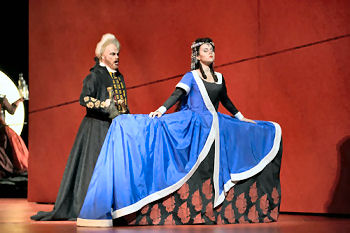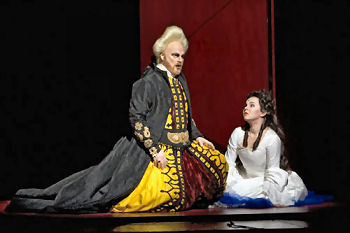Mozart, ‘Mitridate, Re di Ponto’ Orchestra of the Royal Opera House, soloists, cond.
Richard Hickox, Royal Opera House, Covent Garden, 5 July 2005 (ME)
Pietro
Benedetti, the first singer of the role of Sifare in this opera,
apparently told Leopold Mozart that if it was not a success,
he would allow himself to be castrated all over again. Happily
this proved unnecessary, since this dramma per musica,
written when the composer was 14, delighted its first audiences
in Milan – and then promptly fell from grace until 200 years
later when it was revived at Salzburg in 1971. It is, of course,
all about vocal display, the best analogy for a modern audience
being a dramatized Handel oratorio, and to stage it successfully
you need a director capable of respecting its conventions as
well as a cast who are up to the treacherous demands of the
singing – fortunately on this occasion the Royal Opera fulfilled
everything required, almost to the point of making one wonder
why the piece is not more frequently heard. Almost, but not
quite.

Graham
Vick’s production, with striking designs by Paul Brown, was
originally seen in 1991, and it has lost nothing of its original
style and appropriateness; what a joy to see such noble effects
being achieved with such essentially simple means, and to hear
singers able to devote their energies to making the words and
music tell rather than having to participate in yet another
joyless, supposedly ‘updated’ sex n’ bling fest. Of course,
it’s the costumes here which hold all the colour and fascination
for the eye, and rightly so: when Mozart died, his wardrobe
was not that of a pauper but a man fascinated by fashion and
elegant lavishness, and he wrote for an audience who shared
that passion to the same degree as they relished extravagance
in vocal prowess. Movement was necessarily simple, given that
many of the costumes were extremely heavy as well as a couple
of metres wide, and as with the very best productions of Handel
operas and oratorios, the characters were allowed to take centre
stage whilst expressing particular moments of crisis in their
lives.
Bruce
Ford is the most experienced Mitridate around; he has a superb
voice, not at all sweet or mellifluous but agile, slightly astringent
in tone and capable of immense flights of virtuosity. On this
occasion he was slightly less than his best, with some notes
sounding a little anxious: his beautiful first aria, ‘Se di
lauri il crine adorno’ so evocative of Idomeneo’s landing on
the shores of Crete, found his tone somewhat restricted but
he gave a rousing account of ‘Quel ribelle e quell’ingrato.’
His impersonation of the fallible king was as subtle as permitted
by the role, his recitatives being especially telling – and
how right that his final words of acceptance and reconciliation
were allowed to make their impact unhindered by any superfluous
gloss.
Sally
Matthews was a stunning Sifare: this is a hugely demanding role
which this young singer made into a triumph in every way, with
florid passagework of confidence and brilliance, elegantly musical
phrasing of recitative and highly convincing acting. It’s never
easy to be the good guy, but she showed that it can be done
even if the opposing ‘baddie’ is sung by the expected star of
the show. Sifare’s music is the most beautiful in the opera,
his aria ‘Lungi da te, mio bene’ looking forward to Mozart’s
future greatness, and Matthews sang it wonderfully, her voice
blending ideally with the melancholy horn obbligato. The duet
with Aspasia, ‘Se viver non degg’io’ was the sort of thing which
lovers of florid vocal display dream about but so rarely experience - great stuff.

Sifare’s
brother and rival was sung by David Daniels, who was clearly
the reason why many of the audience were there: after every
aria the Danielles bellowed ‘Brahhvo!’ even when the singing
was unremarkable, which was the case most of the time. I found
his performance lazy, as indeed I have done in the past with
this singer. It is, of course, a lovely countertenor voice,
much to be savoured in recital and on disc, but thus far I have
felt that in his ‘live’ performances he tends to coast somewhat,
and this was all the more marked here because of the commitment
displayed by the others onstage. It probably did not help that
both ‘Venga pur, minacci e frema’ and ‘Già dagli occhi velo
è tolto’ were both delivered from a semi-recumbent posture:
the former entirely lacked the requisite fire, but the closing
bars of the latter revealed what a master of the fine phrase
Daniels can be.
Aleksandra
Kurzak was making her house debut as Aspasia, and she is quite
a discovery. This is a vibrant personality, a really outstanding
voice with a confident ring and mastery of the highest notes
– a highly praised Queen of the Night in Hamburg and Olympia
at the Met, she brings that experience to this most fiendish
of Mozart’s roles, and she captivated the audience from the
first lines of ‘Al destin’
che la minaccia’ with her fiery coloratura, sympathetic stage
presence and understanding of the
role – you really felt that this was what Bernasconi
must have been like at the premiere. A notable debut.
Susan
Gritton was equally superb as Ismene: her poignant, sensitive
voice and presence are ideal for this role, and her noble singing
of ‘Tu sai per chi m’accese’ was one of the high points of the
evening – her movement, too, was finely done, in a role not
so burdened with unwieldy costume as the rest but given almost
as much intricacy in gesture as that of a stage dancer. Katie
van Kooten sang with authority as Arbate, and Colin Lee made
an auspicious house debut in the rather thankless role of Marzio.
The
overture might have led one to expect trouble ahead for the
singers, since it was taken at a somewhat too stately pace,
but Hickox went on to coax remarkably sprightly playing from
the orchestra, with the horns especially fine in the obbligatos.
This was a great evening for lovers of unashamed vocal virtuosity,
of which I am definitely one, and in my opinion it was just
what the Royal Opera House should be all about.
Melanie
Eskenazi
Photos
© Clive Barda




